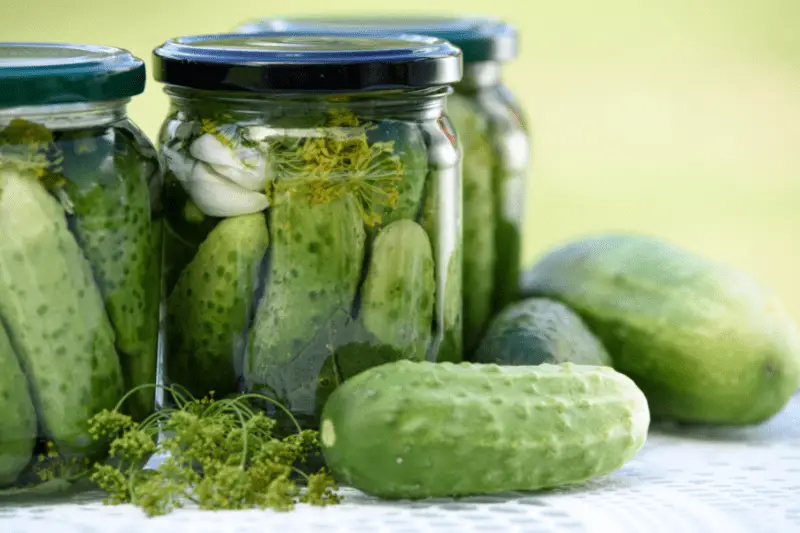Pickles are a popular snack and condiment enjoyed all over the world. They are made by preserving cucumbers in a solution of vinegar, water, salt, and other flavorings.
However, not all pickles are created equal. Two of the most popular types are Polish pickles and Kosher pickles.
While both are delicious and refreshing, their ingredients, preparation methods, and taste differ.
This article will explore the key differences between Polish pickles and Kosher pickles.

What are Polish pickles?
Polish pickles are a traditional food in Poland and other Eastern European countries. They are made using cucumbers that are pickled in a vinegar and brine solution, along with various spices and herbs. The result is a crunchy and slightly sour pickle with a unique flavor.
What are Kosher pickles?
Kosher pickles are a type of pickle that is made according to Jewish dietary laws. They are prepared in a specific way that follows Jewish customs and traditions, which makes them popular among Jewish people all over the world. Kosher pickles are known for their crispy texture and tangy taste.
How are Polish pickles made?
Polish pickles are made by soaking cucumbers in a vinegar and brine solution, along with spices like dill, garlic, and mustard seeds. The cucumbers are left to ferment for several days, which gives them their distinct sour taste. After fermentation, the pickles are jarred and stored in a cool place.
How are Kosher pickles made?
Kosher pickles are made using a special process that involves soaking the cucumbers in a saltwater brine for several days. This allows the cucumbers to ferment naturally, which gives them their signature tangy flavor. Kosher pickles are also known for their crisp texture, which comes from the use of small, fresh cucumbers.
Ingredients used in Polish pickles
The ingredients used in Polish pickles include cucumbers, water, vinegar, salt, and a variety of spices and herbs. Some of the most common spices used in Polish pickles include dill, garlic, and mustard seeds. These spices give Polish pickles their unique flavor and aroma.
Ingredients used in Kosher pickles
The ingredients used in Kosher pickles are similar to those used in Polish pickles, but there are some key differences. Kosher pickles are made using only small, fresh cucumbers, which gives them their crisp texture. In addition, Kosher pickles are made using a special type of salt that does not contain any additives or anti-caking agents.
Texture of Kosher pickles
Kosher pickles have a crispy and crunchy texture. This is because they are made using small, fresh cucumbers that are soaked in a saltwater brine for a shorter period of time than Polish pickles. The use of fresh cucumbers and a shorter fermentation time gives Kosher pickles their distinctive crunch.
Taste of Polish pickles
Polish pickles have a slightly sour taste with a hint of sweetness. The spices and herbs used in the pickling process give Polish pickles their unique flavor. The longer fermentation time also allows the cucumbers to absorb more of the vinegar and brine solution, which adds to the overall taste of the pickle.
Taste of Kosher pickles
Kosher pickles have a tangy and slightly sour taste. The use of a saltwater brine and fresh cucumbers gives Kosher pickles their distinctive flavor. They are also known for their crunch, which adds to the overall taste experience.
Uses of Polish pickles
Polish pickles are a versatile food that can be used in a variety of ways. They are often served as a side dish with sandwiches or burgers, and can also be used to add flavor to salads and other dishes. Polish pickles are also commonly used as a condiment for hot dogs and sausages.
Uses of Kosher pickles
Kosher pickles are also a versatile food that can be used in a variety of ways. They are often served as a snack or side dish, and can also be used to add flavor to sandwiches and salads. Kosher pickles are also commonly used as a condiment for hamburgers and other grilled meats.
Health benefits of Polish pickles
Polish pickles have a number of health benefits. They are low in calories and high in fiber, which can help regulate digestion and promote healthy bowel movements. The vinegar and spices used in Polish pickles also have anti-inflammatory properties, which can help reduce inflammation in the body.
Health benefits of Kosher pickles
Kosher pickles also have a number of health benefits. They are low in calories and high in fiber, which can help promote healthy digestion. In addition, the fermentation process used to make Kosher pickles can help improve gut health by increasing the number of beneficial bacteria in the gut.
Conclusion
In conclusion, while Polish pickles and Kosher pickles are delicious and nutritious, they differ in their preparation methods, ingredients, texture, and taste.
Polish pickles are fermented in a vinegar and brine solution, while Kosher pickles are fermented in a saltwater brine. Polish pickles have a slightly softer texture and a sour-sweet taste, while Kosher pickles have a crispy texture and a tangy-sour taste.
Both types of pickles have their own unique health benefits and are versatile foods that can be used in a variety of ways.
FAQs
- Are Polish pickles and Kosher pickles the same thing? No, they differ in terms of their preparation methods, ingredients, texture, and taste.
- What spices are used in Polish pickles? Some of the most common spices used in Polish pickles include dill, garlic, and mustard seeds.
- Are Kosher pickles healthier than Polish pickles? Both types of pickles have their own unique health benefits and are low in calories and high in fiber.
- What is the difference between a dill pickle and a Kosher pickle? A Kosher pickle is made according to Jewish dietary laws, while a dill pickle refers to any pickle that is flavored with dill.
- Can I make my own Polish or Kosher pickles at home? Yes, both types of pickles can be made at home using a simple recipe and basic ingredients.
